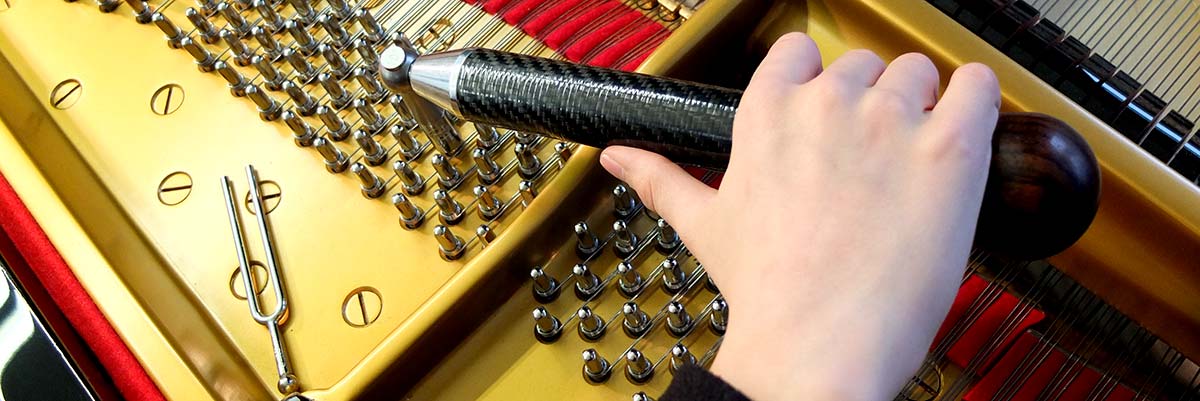
Tuning and services
Out of tune? We will take care.
Are you looking for a piano tuner?
Your piano needs to be repaired? The way it is played no longer pleases you, the sound used to be nicer? Our service team will be happy to advise you on the right time and, if you wish, remind you of the annual piano tuning.
You would like to have your instrument tuned?
Make an appointment at pianostollenwerk@t-online.de or use our easy contact form.
Service
transportation
Do you need to move your upright piano or grand piano? No problem for our specialist removal companies, even under difficult conditions!
You can get an appointment here:
Frankfurter Klaviertransporte
Phone: 069 – 90754863
www.frankfurter-klaviertransporte.de
Pianotrans Fleckner
Phone: 06132 – 97585
www.pianotrans.de
Pati – Klaviertransporte und Umzüge
Phone: 069 – 95408800
www.pati-klaviertransporte.de
Important information for piano owners
A piano is part of our lives; a member of the family and a friend, who often accompanies us for many years.
What do you have to take into account, in order to provide yourself with years of musical enjoyment and have an instrument which maintains its value? Here are the answers to the most important questions regarding climate, location and care.
Why is the climate so important?
The main construction material for pianos is wood, a living material which can expand or contract depending on humidity. Other materials used in the instrument, like metals, felt or leather, react to the indoor climate. Too dry a climate is just as harmful as too much humidity. The more the temperature and humidity fluctuate, the quicker the instrument goes out of tune. Felt, leather and center can become slow, can stick or become noisy. If a piano has been stored in an inappropriate indoor climate for an extended period, serious damage can occur, even resulting in cracks in the construction.
What is the ideal indoor climate for a piano?
We recommend a relative humidity of between 40 and 60% and a room temperature of between 18 and 22°C. Short-term fluctuations are normally harmless. Should these fluctuations occur over a longer period however, these should be controlled with a climate control unit, or the piano should be moved to a more suitable location. Make sure there is constant humidity, especially when central heating is in use.
To measure the indoor climate, we recommend a good digital Hygrometer, positioned near the instrument.
What is the ideal location?
It is no longer generally recommended not to place an upright piano against an exterior wall. Well-insulated houses do not pose a threat to the instrument. The following factors are more important:
- Avoid direct sunlight. It warms the instrument up and causes it to go out of tune more quickly. Veneered instruments can also suffer from discolouration.
- The warm, dry air from underfloor heating rises through the instrument and dries out the wood. This can cause damage, especially to older instruments. Sufficient humidity is very important here.
- Maintain a distance to direct sources of heat, for example radiators, tiled stoves and open fires. Heating leads to a dry indoor climate, especially in winter.
- Cellars tend to be damp, especially in summer which causes mould to grow on the inside of the instrument, resulting in a difficult and lengthy process of removal.
- Keep a distance of a few centimetres between the piano and the wall, in order to make the air circulate behind the instrument as well. This helps to avoid a build-up of moisture.
- Avoid draughts.
How often should a piano be tuned?
That depends on several factors, for example the condition of the instrument, the indoor climate and location, or the personal demands of the pianist. We recommend to have your instrument tuned by a qualified specialist at least once a year.
For schools, for piano teachers or in other institutions where greater demands are placed on instruments, we recommend tuning the instruments more often. If your instrument has not been tuned for a long time, the tension of the strings has probably dropped so much that it will need to be tuned several times before it will hold a standard pitch (440Hz). After transporting an instrument, it is best to wait a few weeks before having it tuned, in order to let the instrument acclimatise to its new location.
Who should tune the instrument?
Make sure that your piano is tuned by a trained piano-builder. He alone learns piano tuning as part of his training. The technique of tuning a piano is a skill which can only be perfected through constant practise and perseverance. Listening to the exact note produced by the instrument is only part of this process. On the other hand, “Piano tuner” is not recognised as a qualification. Anyone can call himself a “piano tuner” without having received any formal training. Having a good pitch, being a good musician or being a piano teacher doesn’t necessarily mean you can tune a piano!
How do I care for the surface?
High-gloss polished polyester surfaces and keyboards should be dusted off without using water. Use a slightly damp, soft cloth to remove dirt and dry the surfaces with chamois leather, if necessary. Tip: Use a little dishwashing liquid in water to remove any stubborn grease marks.
Regular furniture polish can be used to polish wooden veneered instruments.
How to take care of the action?
The indoor climate and the wear caused by playing the instrument change the adjustment of the action and the tone of the instrument. The action has to be adjusted occasionally and the hammer felts voiced in order to maintain optimal playability and tonal quality. We recommend an inspection to be carried out in our workshop every 10 to 20 years, depending on the amount of use the instrument has had. Piano teachers and institutions should have their pianos inspected more regularly.

Stollenwerk GmbH
Rhönstraße 55
60316 Frankfurt
Opening times:
Mo-Fr. 14-18 Uhr
Sa. 10-13 Uhr
Contact
pianostollenwerk@t-online.de
Sales & Service: 069 – 439150
